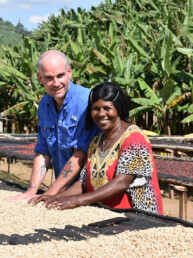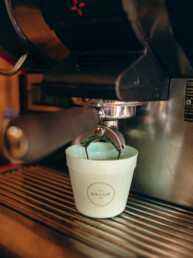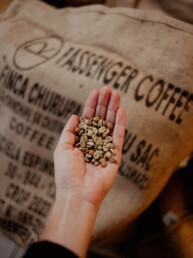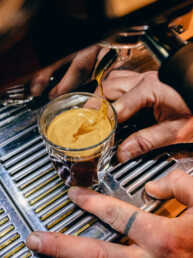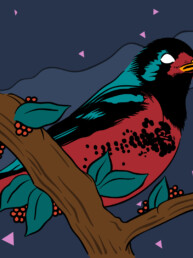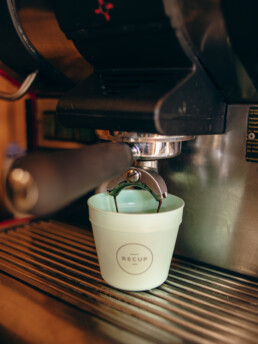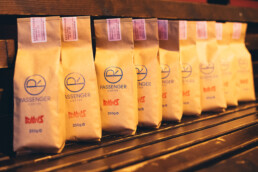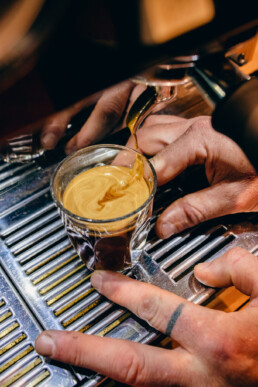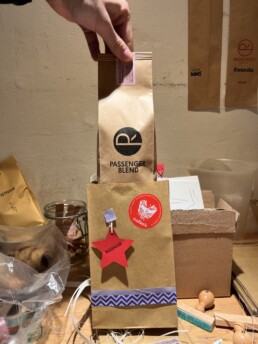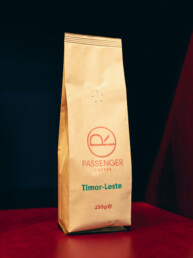News
Reflections on Rwanda — Coffee, Community, and Connection
News
Traveling through Rwanda, visiting its diverse coffee-growing regions, and immersing myself in the culture was a profoundly moving experience. I had the opportunity to witness firsthand the rich tradition in coffee cultivation and see how a company like Raw Material alongside Muraho Trading Company coming from more Western systems of thinking, has worked to implement new structures — not just to improve the coffee supply chain, but to empower communities and cultivate deeper, more sustainable relationships.
When I think about the journey, I’m reminded of the opening line of the Terroir book “Great coffee is the result of a plant’s genotype and the terroir that surrounds it” alongside this statement there is a much deeper message hidden behind, almost making it difficult to capture in words the essence of something which was for me truly inspiring. It’s hard to gather all the impressions, but what follows is a rough constellation of the moments and elements that left the biggest imprint.
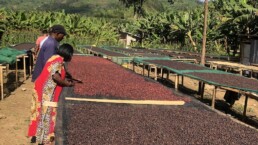
The terroir of Rwanda is breathtaking in its range — from the lush Lake District to the mysterious volcanic regions. These high-altitude areas held something almost mystical. There was a distinct contrast between the tropical softness of certain regions and the robust, dense intensity of the volcanic soil. Each landscape seemed to echo a different spirit, which one could almost sense in the cup.

And then, the people. Rwanda’s past — brutal and unthinkably painful — somehow manifests in the present as a quiet strength, a collective integrity, and an unshakable sense of togetherness. There’s joy in the work, honesty in the communication, and a deep-rooted compassion in how people interact, collaborate, and harvest. Village-level teamwork and traditional practices meet with modern agronomic support from varying organizations, such as Muraho and Raw Material, trying to bring continued quality, efficiency and dignity into the process.

Raw Material in collaboration with the Muraho Trading Company in particular stood out — not just for the systems they’re building, but for the authenticity of their relationships. I spent time with them in Kigali, often in surprisingly luxurious settings, but what was more striking was seeing how they move between these different worlds — from city to countryside, comfort to challenge — always with the same purpose.
You realize how easily we, from the outside, carry a naive image of Rwanda. Yes, poverty exists, but it’s far from the full picture. There’s a complex social structure and layers of support, ambition, and pride. There is a grace in the way people move through their days.
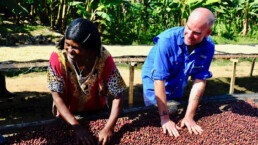
One of the most powerful parts of the journey was at The Vunga Cooperative in Rwanda’s Nyabihu District, the volcanic region, where I met President Daphrose Uwimana, the woman leading an organization that’s endured extraordinary hardship. After several landslides devastated their community, they rebuilt — again and again. The resilience, the quiet strength, the collective response… it was overwhelming to witness.
At the heart of the entire experience was a deep focus on community. Everything — from the plantations to the city — reflected a strong ethic of shared joy, reward through collaboration, and a human-centered approach. It felt like the scars of the past had inspired a radical, beautiful kind of togetherness.
A huge thank you goes out to Alan Tomlins and the Raw Materialteam, Gaudam Anbalagan, Karthick Anbalagan and Eustache Mutakirwa from Muraho.
Hobe Hobe Hobe!
Reflections on Rwanda — Coffee, Community, and Connection
21. May 2025
Traveling through Rwanda, visiting its diverse coffee-growing regions, and immersing myself in the culture was a profoundly moving experience.
ONE EASY PIECE | Changing the habit - one cup at a time.
16. May 2025
Since May 1st, we’re adding a 30ct charge for to-go cups.
Not because we love annoying fees, but because something has to change.
Why coffee is getting more expensive - and what that means for you
30. April 2025
It's time to inform you about the price explosion on the coffee market, what's behind it and what consequences it has for us as a roastery, but also for our café and in the end of course your cup of coffee.
Summer in a glass: our new Cold Brew
25. March 2025
The sun is rising higher, the days are getting longer and the air is humming with anticipation of the warmth. It's cold brew season again.
(No) extra charge for (Oat) milk!
28. January 2025
PASSENGER serves you a universe of coffee in your cup - without compromise. We waive the usual surcharge for milk alternatives!
Subscriptions are free of shipping costs from the second delivery onwards
15. November 2024
News from the delivery front: The journey of coffee - from the bean to your cup - is a real adventure of love.
Concentrated sunshine
17. July 2024
Caffeine is a psychoactive substance which, in the right dosage, can have a stimulating effect on the consumer's perceptual apparatus.<>nehmungsapparat des Konsumierenden auswirken kann.
PASSENGER coffee subscription
14. December 2023
Unlock a universe of coffee in your cup with passenger coffee's subscription!
Queer Aid Uganda x passenger coffee
1. August 2023
We are happy to finally were able to conclude our donation into the emergency fund for the LGBTIQ+ community in Uganda. Thank you for drinking our Uganda Filter coffee and help to collect 742€.
ONE EASY PIECE | Changing the habit - one cup at a time.
News
ONE EASY PIECE
Changing the habit - one cup at a time.
Since May 1st, we’re adding a 30ct charge for to-go cups.
Not because we love annoying fees, but because something has to change.
Yes, our current cups are compostable, bio-certified, top-tier Bionatic gear—but still:
They’re single-use.
They take energy to make, ship, and break down.
And then end up in the trash right after use.
We think we can all do better—together.
So, what now?
You’ve got three solid options.
– Drink in house. Enjoy the vibe with your coffee and rush on after.
– Borrow a RECUP. There are spreading options to return them. Those cups need 30–40 uses to actually offset their footprint compared to one-way cups. So use it or get rid of it and keep it in circulation.
– Bring your own. Simple. Easy. Same great coffee in your personal cup.

We know a 30-cent change isn’t world-saving on its own.
But the habit behind it just might be.
We’re always working on how to run PASSENGER in the most sustainable way possible. From our Loring roaster to recyclable bags, it’s all part of the same journey. And this is one more piece. An easy one to have impact if we make it a habbit that spreads.
Thanks for being part of this.
Thanks for sipping with care.
Yours truly,
The PASSENGER Team
Reflections on Rwanda — Coffee, Community, and Connection
21. May 2025
Traveling through Rwanda, visiting its diverse coffee-growing regions, and immersing myself in the culture was a profoundly moving experience.
ONE EASY PIECE | Changing the habit - one cup at a time.
16. May 2025
Since May 1st, we’re adding a 30ct charge for to-go cups.
Not because we love annoying fees, but because something has to change.
Why coffee is getting more expensive - and what that means for you
30. April 2025
It's time to inform you about the price explosion on the coffee market, what's behind it and what consequences it has for us as a roastery, but also for our café and in the end of course your cup of coffee.
Summer in a glass: our new Cold Brew
25. March 2025
The sun is rising higher, the days are getting longer and the air is humming with anticipation of the warmth. It's cold brew season again.
(No) extra charge for (Oat) milk!
28. January 2025
PASSENGER serves you a universe of coffee in your cup - without compromise. We waive the usual surcharge for milk alternatives!
Subscriptions are free of shipping costs from the second delivery onwards
15. November 2024
News from the delivery front: The journey of coffee - from the bean to your cup - is a real adventure of love.
Concentrated sunshine
17. July 2024
Caffeine is a psychoactive substance which, in the right dosage, can have a stimulating effect on the consumer's perceptual apparatus.<>nehmungsapparat des Konsumierenden auswirken kann.
PASSENGER coffee subscription
14. December 2023
Unlock a universe of coffee in your cup with passenger coffee's subscription!
Queer Aid Uganda x passenger coffee
1. August 2023
We are happy to finally were able to conclude our donation into the emergency fund for the LGBTIQ+ community in Uganda. Thank you for drinking our Uganda Filter coffee and help to collect 742€.
Why coffee is getting more expensive - and what that means for you
News
Dear PASSENGER customers
It's time to inform you about the price explosion on the coffee market, what's behind it and what consequences it has for us as a roastery, but also for our café and in the end of course your cup of coffee.
The price for coffee reached a historic all-time high in February this year and it is lingering around on a high level since. It is unlikely the price will return to the former standard in the near future. It is more likely that there will be long-term changes in the market.
The reasons for the rise are complex, but the fundamental logic driving the price of coffee is that of supply and demand. In recent years, demand has not been met by the yields from the annual harvests and coffee warehouses around the world have gradually been bought out. They are now exhausted!
In addition, a combination of different events caused the price explosion that started rolling in November 2024. Above all, it was the harvest forecasts from Brazil. The first forecasts for crop yields are published there in November and the flowering level for the coming harvest is foreseeable. Both showed a clear downward trend and thus the upward trend in the coffee price began:
The causes of the price increase
1. Climate change and extreme weather conditions
In key growing countries such as Brazil and Vietnam, extreme weather events, including droughts, unusually heavy rainfall and extreme temperatures, have led to significant crop failures.
PASSENGER is working with green coffee traders and agronomists in critical growing areas who are driving key initiatives to empower farmers and the land and crops, prepare for change and counteract impacts on this scale.
2. Rising demand
Global coffee consumption is growing steadily, especially in countries such as China and India. This increased demand meets with limited supply and is driving prices further upwards.
3. Logistical Challenges
Global supply chain issues, including high transportation costs and port congestion, have impacted the availability of coffee and led to additional costs (Red Sea Crisis and aftermath of Corona.
4. Speculation on the commodities markets
Uncertainty about future harvests and market conditions has led to increased speculation and heightened price volatility. Donald made sure to add a good amount of uncertainty on top of it all.
And now what?
So there is a lot of excitement along the entire supply chain and producers are waiting for the cash flow to invest and increase production as quickly as possible, which should ultimately calm the market. However, demand has become so out of kilter with supply that it will probably take a few years, even under good conditions, before a stable situation is restored and inventories are sufficiently stocked to contribute to price stability.
However, the previous situation is not desirable and PASSENGER welcomes an increase in costs in the market segment of commercial coffee, even if the effects also represent a challenge for us.
Perspective
The price of coffee was far too low in the past. Growing coffee is incredibly hard, time-consuming, risky and costly work. The poor conditions for producers have meant that there are fewer and fewer coffee farmers. Those who continued to produce did not have sufficient financial resources to reinvest in their farms and infrastructure, which meant that quantity and quality suffered and improvement was not possible. At the same time, there have never been so many programs and initiatives that focus on improving sustainability, social and cultural conditions and environmental responsibility.
The current situation reinforces PASSENGER's position of supporting sustainable cultivation and trade at all costs, working with smaller companies and negotiating directly with producers wherever possible.
Accordingly, the effects of the market situation on our purchase price are not as blatant as in the C-price segment.
This is because a good bond, top prices for the qualities that have already been paid for some time and constantly intensified contact with traders and farmers have given us an advantage and the price increase for roasted coffee is relatively small.
Best regards from the roastery
Jan and the PASSENGER Crew
Reflections on Rwanda — Coffee, Community, and Connection
21. May 2025
Traveling through Rwanda, visiting its diverse coffee-growing regions, and immersing myself in the culture was a profoundly moving experience.
ONE EASY PIECE | Changing the habit - one cup at a time.
16. May 2025
Since May 1st, we’re adding a 30ct charge for to-go cups.
Not because we love annoying fees, but because something has to change.
Why coffee is getting more expensive - and what that means for you
30. April 2025
It's time to inform you about the price explosion on the coffee market, what's behind it and what consequences it has for us as a roastery, but also for our café and in the end of course your cup of coffee.
Summer in a glass: our new Cold Brew
25. March 2025
The sun is rising higher, the days are getting longer and the air is humming with anticipation of the warmth. It's cold brew season again.
(No) extra charge for (Oat) milk!
28. January 2025
PASSENGER serves you a universe of coffee in your cup - without compromise. We waive the usual surcharge for milk alternatives!
Subscriptions are free of shipping costs from the second delivery onwards
15. November 2024
News from the delivery front: The journey of coffee - from the bean to your cup - is a real adventure of love.
Concentrated sunshine
17. July 2024
Caffeine is a psychoactive substance which, in the right dosage, can have a stimulating effect on the consumer's perceptual apparatus.<>nehmungsapparat des Konsumierenden auswirken kann.
PASSENGER coffee subscription
14. December 2023
Unlock a universe of coffee in your cup with passenger coffee's subscription!
Queer Aid Uganda x passenger coffee
1. August 2023
We are happy to finally were able to conclude our donation into the emergency fund for the LGBTIQ+ community in Uganda. Thank you for drinking our Uganda Filter coffee and help to collect 742€.
Summer in a glass: our new Cold Brew
News
Liquid gold, chilled
The sun tilts higher, the days stretch longer, and the air hums with the promise of warmth. It’s cold brew season again. And this year, we’re starting with something truly special: a micro-lot of naturally processed coffee from Peru, grown by none other than Jhon Silva and sourced once again through our friends at @redbeetlecoffeelab .
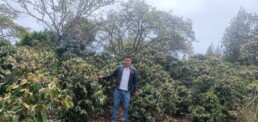
Coffee Details:
Country: Peru
Region: Queromarca, Cajamarca
Producer: Jhon Silva
Variety: Bourbon, Caturra
Altitude: 1,850 meters above sea level
Processing: Natural
Farm Size: 2 hectares
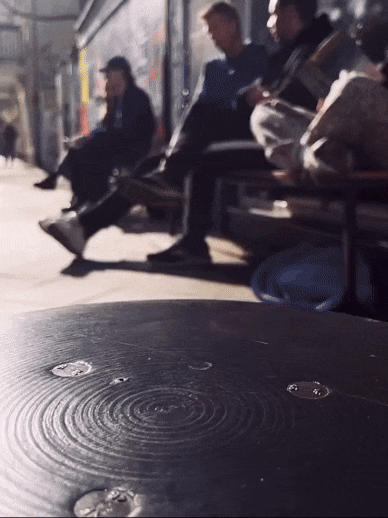
A coffee like this doesn’t just happen. It’s coaxed into being. Natural processing means the cherries are left to dry with their fruit intact, allowing the sugars to infuse the beans as they slowly transform under the sun. The result? A cold brew with an unmistakable vibrancy—rich, juicy, and alive.
With every sip, you’ll find a deep sweetness, like ripe berries bursting on your tongue, balanced by a cocoa-like smoothness that lingers. It’s full-bodied but refreshing, intense yet effortlessly drinkable. Cold brew should feel like a sunbeam through ice—bold but easy, crisp but full of warmth. This one does just that.
But how do we make it? Cold brew isn’t just iced coffee—it’s a slow and delicate extraction. We start with a coarse grind, steeping the coffee in cold, filtered water for 16 to 24 hours. This gentle process pulls out the deep, chocolatey sweetness and fruit-forward flavors while leaving behind any harsh acidity. Once fully brewed, we filter it carefully, resulting in a smooth, concentrated elixir that’s best enjoyed over ice or with a splash of milk.
Come by PASSENGER and try it for yourself. It won't be around forever - and you don't want to miss it!

Reflections on Rwanda — Coffee, Community, and Connection
21. May 2025
Traveling through Rwanda, visiting its diverse coffee-growing regions, and immersing myself in the culture was a profoundly moving experience.
ONE EASY PIECE | Changing the habit - one cup at a time.
16. May 2025
Since May 1st, we’re adding a 30ct charge for to-go cups.
Not because we love annoying fees, but because something has to change.
Why coffee is getting more expensive - and what that means for you
30. April 2025
It's time to inform you about the price explosion on the coffee market, what's behind it and what consequences it has for us as a roastery, but also for our café and in the end of course your cup of coffee.
Summer in a glass: our new Cold Brew
25. March 2025
The sun is rising higher, the days are getting longer and the air is humming with anticipation of the warmth. It's cold brew season again.
(No) extra charge for (Oat) milk!
28. January 2025
PASSENGER serves you a universe of coffee in your cup - without compromise. We waive the usual surcharge for milk alternatives!
Subscriptions are free of shipping costs from the second delivery onwards
15. November 2024
News from the delivery front: The journey of coffee - from the bean to your cup - is a real adventure of love.
Concentrated sunshine
17. July 2024
Caffeine is a psychoactive substance which, in the right dosage, can have a stimulating effect on the consumer's perceptual apparatus.<>nehmungsapparat des Konsumierenden auswirken kann.
PASSENGER coffee subscription
14. December 2023
Unlock a universe of coffee in your cup with passenger coffee's subscription!
Queer Aid Uganda x passenger coffee
1. August 2023
We are happy to finally were able to conclude our donation into the emergency fund for the LGBTIQ+ community in Uganda. Thank you for drinking our Uganda Filter coffee and help to collect 742€.
(No) extra charge for (Oat) milk!
News
PASSENGER serves you a universe of coffee in your cup - without compromise.
We waive the usual surcharge for milk alternatives!
Whether with fresh Demeter milk from the eco-village Brodowin or Organic Minor Figures oat milk, your choice comes at no extra cost.
Why, why and why?
Why is there a surcharge of 20ct, 30ct or even 50ct for a plant-based milk drink at all?
The purchase price in retail compared to cow's milk is higher on average for a product of comparable quality. The linked article provides a clear breakdown of the production costs and the end consumer price. (brandeins)
Another cost factor: VAT. While the reduced tax rate of 7 percent applies to milk as a staple food, plant-based alternatives are taxed at 19 percent because they fall into the category of processed foods or staple foods. This special tax situation means that, at least in the case of a to-go item, either 7% or 19% is charged on the item. The profit margin for a café varies dramatically for a cappuccino to-go for an assumed €3.50. Either 23ct or 56ct VAT must be paid.
Is there anything cheap about plant milk? As a rule, the shelf life is longer and this can save costs in purchasing and logistics. It can be stored unrefrigerated, which means no additional energy, maintenance and purchase costs (for refrigerators), at least compared to fresh cow's milk. A not insignificant aspect for a café operator.
Why not an extra charge on your oat coffee then?

PASSENGER wants to support customers' ecologically sensible decision to choose a plant-based drink. The ecological balance of milk alternatives is better than cow's milk.
This applies to the areas of resources, production and processing, transport logistics and storage.
The production of milk alternatives means less animal suffering. Although the conditions on the farms and the situation of dairy farmers as a whole are very different and need to be considered carefully, the one thing they all have in common is that the price war in the dairy industry puts dairies and farmers under a lot of pressure and ultimately the animals suffer as a result.
So why not a surcharge for dairy milk?
By equalizing the prices of drinks with milk or plant-based alternatives, PASSENGER raises the price of milk drinks!
Cow's milk is actually traded too cheaply. The market power of discounters in particular exerts enormous price pressure on retailers. Fresh milk is transported across the country without regard for losses in quality, energy efficiency, political or social sustainability, or climate compatibility, simply in order to serve the huge low-price sector and establish a low price on the market. High prices must always be justified. But let's turn the cow around and ask: How can such low prices be justified? Muuuuh. Exactly!
PASSENGER only offers the organic oat drink from MINOR FIGURES as a milk alternative.
The milk alternative was developed by Minor Figures to support the coffee flavor without overpowering it. It has an excellent texture and supports our work as a roastery by enhancing the taste of the PASSENGER coffee in the cup.
If neither of these appeals to you, we recommend drinking our coffees black!
References:
- https://www.brandeins.de/magazine/brand-eins-wirtschaftsmagazin/2022/preise/weisses-gold
- https://www.dlg.org/mediacenter/dlg-merkblaetter/dlg-kompakt-04-2024-anbindehaltung-von-milchkuehen-in-deutschland
- https://www.bmel.de/SharedDocs/Pressemitteilungen/DE/2024/139-milchbauern.html
- https://www.worldcoffeeportal.com/5THWAVE/Podcast
Reflections on Rwanda — Coffee, Community, and Connection
21. May 2025
Traveling through Rwanda, visiting its diverse coffee-growing regions, and immersing myself in the culture was a profoundly moving experience.
ONE EASY PIECE | Changing the habit - one cup at a time.
16. May 2025
Since May 1st, we’re adding a 30ct charge for to-go cups.
Not because we love annoying fees, but because something has to change.
Why coffee is getting more expensive - and what that means for you
30. April 2025
It's time to inform you about the price explosion on the coffee market, what's behind it and what consequences it has for us as a roastery, but also for our café and in the end of course your cup of coffee.
Summer in a glass: our new Cold Brew
25. March 2025
The sun is rising higher, the days are getting longer and the air is humming with anticipation of the warmth. It's cold brew season again.
(No) extra charge for (Oat) milk!
28. January 2025
PASSENGER serves you a universe of coffee in your cup - without compromise. We waive the usual surcharge for milk alternatives!
Subscriptions are free of shipping costs from the second delivery onwards
15. November 2024
News from the delivery front: The journey of coffee - from the bean to your cup - is a real adventure of love.
Concentrated sunshine
17. July 2024
Caffeine is a psychoactive substance which, in the right dosage, can have a stimulating effect on the consumer's perceptual apparatus.<>nehmungsapparat des Konsumierenden auswirken kann.
PASSENGER coffee subscription
14. December 2023
Unlock a universe of coffee in your cup with passenger coffee's subscription!
Queer Aid Uganda x passenger coffee
1. August 2023
We are happy to finally were able to conclude our donation into the emergency fund for the LGBTIQ+ community in Uganda. Thank you for drinking our Uganda Filter coffee and help to collect 742€.
Subscriptions are free of shipping costs from the second delivery onwards
News
News from the Delivery Front:
The journey of coffee, from bean to cup, is a testament to its enduring allure. For us at Passenger Coffee, the journey extends further—to your doorstep, delivered via DHL. But now, this journey gets even sweeter: with our subscription service, you only pay the delivery fee for your first shipment. Every subsequent delivery? Free of charge.
Think of it as a thank-you for your loyalty. Or perhaps, a gentle nudge to ensure your mornings remain grounded in the comfort of our sustainably sourced coffee.
One small fee. Endless cups of concentrated sunshine. ☕
*only applies to orders within Germany from 36€
Reflections on Rwanda — Coffee, Community, and Connection
21. May 2025
Traveling through Rwanda, visiting its diverse coffee-growing regions, and immersing myself in the culture was a profoundly moving experience.
ONE EASY PIECE | Changing the habit - one cup at a time.
16. May 2025
Since May 1st, we’re adding a 30ct charge for to-go cups.
Not because we love annoying fees, but because something has to change.
Why coffee is getting more expensive - and what that means for you
30. April 2025
It's time to inform you about the price explosion on the coffee market, what's behind it and what consequences it has for us as a roastery, but also for our café and in the end of course your cup of coffee.
Summer in a glass: our new Cold Brew
25. March 2025
The sun is rising higher, the days are getting longer and the air is humming with anticipation of the warmth. It's cold brew season again.
(No) extra charge for (Oat) milk!
28. January 2025
PASSENGER serves you a universe of coffee in your cup - without compromise. We waive the usual surcharge for milk alternatives!
Subscriptions are free of shipping costs from the second delivery onwards
15. November 2024
News from the delivery front: The journey of coffee - from the bean to your cup - is a real adventure of love.
Concentrated sunshine
17. July 2024
Caffeine is a psychoactive substance which, in the right dosage, can have a stimulating effect on the consumer's perceptual apparatus.<>nehmungsapparat des Konsumierenden auswirken kann.
PASSENGER coffee subscription
14. December 2023
Unlock a universe of coffee in your cup with passenger coffee's subscription!
Queer Aid Uganda x passenger coffee
1. August 2023
We are happy to finally were able to conclude our donation into the emergency fund for the LGBTIQ+ community in Uganda. Thank you for drinking our Uganda Filter coffee and help to collect 742€.
Concentrated sunshine
The chemical compound 1,3,7-trimethylxanthine known as caffeine, is probably the most commonly consumed psychotropic substance in the world. Not only humans, but in the entire animal kingdom it enjoys enormous popularity. The natural supply is also more versatile than is generally assumed: Caffeine is found in the plant parts of coffee, cocoa, guarana, tea and cola nuts, as well as in the flowers and nectar of some citrus fruits.
Once Alexander von Humboldt described a cup of coffee as concentrated sunshine, thus vividly illustrating the importance of the drink and its effect on people.
It was primarily this effect and certainly not the taste that was responsible for its worldwide spread. Just as it is the case with other drugs: they are rarely consumed because of their taste! But what is the adaptive advantage of a plant that becomes a caffeine producer?
What function does caffeine fulfill for these plants?
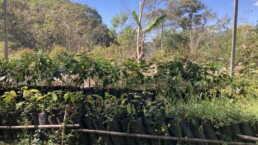
Plants utilize the effect of caffeine on the consumer's nervous system in two different ways:
On the one hand, there is the defense function - the production of caffeine serves to protect the plants from predators. Due to the bitter smell and taste of caffeine and the toxic effect on the organism that occurs at higher doses, the plants are generally avoided by the animals. For a long time, this protective mechanism served as sufficient and sole justification for caffeine's raison d'être.
But as scientists have been able to prove in the last 10 years, the plants have gained another advantage for selection: through the loyalty function.
Caffeine is a psychoactive substance which, in the right dosage, can have a stimulating effect on the consumer's perceptual apparatus. The stimulant increases attention, memory, concentration, motivation and confidence - in short, it makes you alert and invigorates you.
This is nothing new and certainly the reason why millions of people visit our cafés every day. But humans were not the first caffeine addicts!
Who were the first coffee junkies?

Bees.
A scientific study from 2013 was able to show that some plants were able to attract bees, in particular thanks to the caffeine content in their flowers. The bees are guided by the scent of the flowers and prefer to visit plants that have already rewarded them with nectar for pollination.
If the nectar also contains caffeine, it induces increased concentration and memory performance in the bees. This means customers return to the same plants even more frequently. By turning the bees into reliable regulars through caffeine production, the hosts benefit from increased pollination and thus an increase in their population. Business is booming.
The analogy between this second evolutionary strategy and the relationship between roasters and café operators and your customers is obvious. We relentlessly tempt you with the same drug in different guises of roasts, blends, exotic specialties and beverage creations to manipulate your habits. There's also no denying that the complex and subtle taste of the drink has become more convincing in recent decades, contributing to its popularity. But when you look at their faces in the morning, there's nothing to hide the fact that it's all about the stuff - the kick, the capture of the spirit and the drop of
Of course, this is written by a junkie and dealer who is highly addicted himself and is committed to this path of no return. Because life wants to be lived.
But we also have something delicious on the passenger shelf for the teetotallers, the clean ones and the dreamers. Or for some, it may be a completely new experience without hesitation, a change of perspective: PASSENGER Colombian Sugar Cane DECAF! Disenchanted by its psychotropic effect. Its taste alone is convincing. Warning: it can also be addictive!
Cheers to the power of plants!
References:
-
Pollan, Michael: This is your mind on Plants, Penguin Books, 2021.
-
Wright, G.A., et al.: Caffeine in Floral Nectar Enhances a Pollinator’s Memory of Reward., Science339, no. 6124 (March 8, 2013): 1202-4.
Reflections on Rwanda — Coffee, Community, and Connection
21. May 2025
Durch Ruanda zu reisen, seine vielfältigen Kaffeeanbaugebiete zu besuchen und in die Kultur…
ONE EASY PIECE | Changing the habit - one cup at a time.
16. May 2025
Seit dem 1. Mai berechnen wir 30 ct für To-Go-Becher. Nicht, weil wir gerne Gebühren erheben,…
Why coffee is getting more expensive - and what that means for you
30. April 2025
es ist an der Zeit, euch über die Preisexplosion auf dem Kaffeemarkt zu informieren – über die…
Summer in a glass: our new Cold Brew
25. March 2025
Die Sonne steigt höher, die Tage werden länger und die Luft summt vor Vorfreude auf die Wärme. Es…
(No) extra charge for (Oat) milk!
28. January 2025
PASSENGER serves you a universe of coffee in your cup - without compromise. We...
Subscriptions are free of shipping costs from the second delivery onwards
15. November 2024
News from the delivery front: The journey of coffee - from the bean to your cup - is...
Concentrated sunshine
17. July 2024
Caffeine is a psychoactive substance which, in the right dosage, can have a stimulating effect on the consumer's perceptual apparatus.
PASSENGER coffee subscription
14. December 2023
Unlock a universe of coffee in your cup with passenger coffee's subscription!
Queer Aid Uganda x passenger coffee
1. August 2023
We are happy to finally were able to conclude our donation into the emergency fund for the LGBTIQ+ community in Uganda...
PASSENGER coffee subscription
News
Discover a Universe Of Coffee In Your Cup with the PASSENGER subscription
Here's How to Get Started:
Browse our coffee selection and choose your favourites.
2. Select 'Subscribe' when subscribing and set the intervals at which you would like to receive the coffee.
3. Pay for your subscription with PayPal or Stripe so we can regularly and automatically collect your invoice amount.
3. Get your coffee!
4. You can cancel your subscription at any time! You can make changes at any time in your Customer Account .
You can find more information about the subscriptions here: https://www.passenger-coffee.de/abo
16. May 2025
ONE EASY PIECE | Changing the habit - one cup at a time.
Seit dem 1. Mai berechnen wir 30 ct für To-Go-Becher. Nicht, weil wir gerne Gebühren erheben,…
30. April 2025
Why coffee is getting more expensive - and what that means for you
es ist an der Zeit, euch über die Preisexplosion auf dem Kaffeemarkt zu informieren – über die…
25. March 2025
Summer in a glass: our new Cold Brew
Die Sonne steigt höher, die Tage werden länger und die Luft summt vor Vorfreude auf die Wärme. Es…
28. January 2025
(No) extra charge for (Oat) milk!
PASSENGER serves you a universe of coffee in your cup - without compromise. We...
15. November 2024
Subscriptions are free of shipping costs from the second delivery onwards
News from the delivery front: The journey of coffee - from the bean to your cup - is...
17. July 2024
Concentrated sunshine
Caffeine is a psychoactive substance which, in the right dosage, can have a stimulating effect on the consumer's perceptual apparatus.
Timor-Leste Laclo Natural
News
Timor-Leste Laclo Natural – some wild gourmet fix
This extraordinary coffee stems from the forests of Laclo village in the northern hills of the Ermera district of Timor-Leste. It is processed at the Raimutin Community Wet Mill, which was established by the non-profit coffee trading organization Raw Material in 2018 and has since acted as a hub to reach out to resident farmers and provide them with a viable option in the specialty market.
Coffee trees in East-Timor grow wild - scattered in the forest and almost entirely left on their own devices with limited intervention and attention by the farmers. There is only very limited agronomic attention taking place and the wild grown coffee is therefore by naturally organic. Until it comes to harvesting the farmers merely visit their crop and more likely gather coffee than actually grow it.
The coffee consists of the Typica and Hybrid de Timor Variation.
Last mentioned is a rare interspecific cross between coffee arabica and coffee canephora aka robusta identified on the island in 1917. This spontaneous natural hybrid obtained fame due to its outstanding resistance to coffee rust and vigour and was soon cultivated in other coffee regions around the world. Cross breeding led to the popular Hybrids like Catimor, Ruiru or Sarchimore.
Despite the close relationship to the canephora species, the Hybrid de Timor coffee is acclaimed for fine stonefruit notes in its taste profile with a low acidity. At the same time this variation with its resilient character is in focus of important research which deals with climate change and its effects on coffee cultivation. The economic situation of Timor–Leste calls for an urgent fix and coffee is an important player for the island and its population of which 25% are relying almost solely on coffee. While the countries former No.1 petroleum industry sieges, the agricultural sector and foremost the coffee export as the most valuable crop for the country is being revitalized and improved. Due to poor infrastructure the production costs are on a high level and the improvement of processing and education of the farmers a crucial step towards a prospering coffee economy on Timor-Leste.
In the cup it develops sweet nectar and floral notes accompanied by a soothing taste of baked plum on a creamy like mouthfeel with a medium body.
16. May 2025
ONE EASY PIECE | Changing the habit - one cup at a time.
Seit dem 1. Mai berechnen wir 30 ct für To-Go-Becher. Nicht, weil wir gerne Gebühren erheben,…
30. April 2025
Why coffee is getting more expensive - and what that means for you
es ist an der Zeit, euch über die Preisexplosion auf dem Kaffeemarkt zu informieren – über die…
25. March 2025
Summer in a glass: our new Cold Brew
Die Sonne steigt höher, die Tage werden länger und die Luft summt vor Vorfreude auf die Wärme. Es…
28. January 2025
(No) extra charge for (Oat) milk!
PASSENGER serves you a universe of coffee in your cup - without compromise. We...
15. November 2024
Subscriptions are free of shipping costs from the second delivery onwards
News from the delivery front: The journey of coffee - from the bean to your cup - is...
17. July 2024
Concentrated sunshine
Caffeine is a psychoactive substance which, in the right dosage, can have a stimulating effect on the consumer's perceptual apparatus.
Queer Aid Uganda x passenger coffee
We are happy to finally were able to conclude our donation into the emergency fund for the LGBTIQ+ community in Uganda. Thank you for drinking our Uganda Filter coffee and help to collect 742 euros.
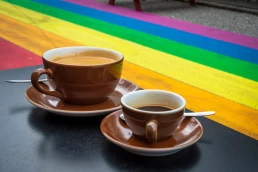
16. May 2025
ONE EASY PIECE | Changing the habit - one cup at a time.
Seit dem 1. Mai berechnen wir 30 ct für To-Go-Becher. Nicht, weil wir gerne Gebühren erheben,…
30. April 2025
Why coffee is getting more expensive - and what that means for you
es ist an der Zeit, euch über die Preisexplosion auf dem Kaffeemarkt zu informieren – über die…
25. March 2025
Summer in a glass: our new Cold Brew
Die Sonne steigt höher, die Tage werden länger und die Luft summt vor Vorfreude auf die Wärme. Es…
28. January 2025
(No) extra charge for (Oat) milk!
PASSENGER serves you a universe of coffee in your cup - without compromise. We...
15. November 2024
Subscriptions are free of shipping costs from the second delivery onwards
News from the delivery front: The journey of coffee - from the bean to your cup - is...
17. July 2024
Concentrated sunshine
Caffeine is a psychoactive substance which, in the right dosage, can have a stimulating effect on the consumer's perceptual apparatus.
- 1
- 2

